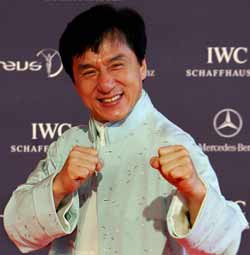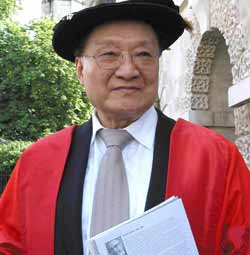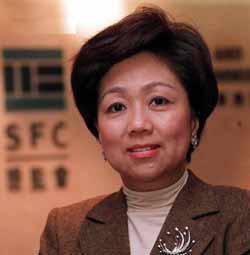| Home / HKSAR 10th Anniversary / From Beijing Review | Tools: Save | Print | E-mail | Most Read |
| Famous Hong Kong Faces on the Mainland (2) |
| Adjust font size: |
Mega-Star of Kungfu
Born to the family of a cook and a housekeeper in Hong Kong, Chan's father was his first kungfu teacher. He believed that learning kungfu would help build his boy's character, and teaching him patience, strength and courage. When Chan was seven years old his father took a job in Australia. The parents left Chan behind in Hong Kong and enrolled him in the China Drama Academy where Chan lived for the next 10 years training in martial arts, dance, acrobatics, singing and comedy. In Chan's biography, he looked back on this period of his life with considerable affection despite the extraordinary hardships, including regular beatings and near-starvation. In the academy, he not only learned the skills of his profession but also built a network of friends, which would sustain his film career for decades. Starting as a stuntman and an extra in the Hong Kong film industry in his teenage years, Chan has earned the respect of his fans by committing himself wholeheartedly to creating the most death-defying stunts possible. His daring feats have secured him a place in movie audiences' hearts and at the box office. Since Chan was appointed as a UN Goodwill Ambassador by UN Children's Fund and Joint United Nations Program on HIV/AIDS in 2004, he has spent a lot of his spare time on charity work. Best Wuxia Author
Cha's fiction has a widespread following in Chinese-speaking areas, including the Chinese mainland, Hong Kong, Taiwan, and Southeast Asia. His 15 novels and short fictions-composed between 1955 and 1972-made him the best-selling Chinese author alive. Over 300 million copies of his works have been sold worldwide; more than 1 billion if one includes bootleg copies. All of his novels have since been adapted into films, TV series and radio series in Hong Kong, Taiwan and on the Chinese mainland. The important characters in his novels are so well known to the public that they can be alluded to with ease between all three regions. In addition, the study of his work has created an independent branch of study called Jinology. A native of Zhejiang Province in east China, Cha is the second of seven children from an illustrious family of scholars; his grandfather achieved remarkable success at the imperial examination. Cha was an avid reader of literature from an early age, especially of wuxia fiction, which provided him with a strong background for the ample dose of cultural and historical context in his future fictions. Stock Market Iron Lady
Laura Cha was appointed by the Central Government as vice chairwoman of the China Securities Regulatory Commission (CSRC) in early 2001 and served in the post until 2004. She was the first person outside the mainland to join the Chinese Government at the vice-ministerial rank. Her efforts were focused on improving the corporate governance of Chinese listed companies and the process of public issuance of shares in China. She is currently the vice chairwoman of the International Advisory Council of the CSRC. Before joining CSRC, Laura Cha spent 10 years with Hong Kong's capital markets regulator, the Securities and Futures Commission, and was appointed deputy chairwoman in 1998. On her appointment, her public service experience in regulating Hong Kong's capital market was highly valued, and helped her to rein in the emerging market on the Chinese mainland. Cha believes that China's economic reforms and expansion into new markets will dramatically improve China's capital markets while at the same time aligning them with international standards. She has cited several driving forces for capital market development in China: a new economic growth model, the rapid growth of the private sector, the pressing need for pension reform, remarkable investor demand and China's entry into the WTO in 2001. During her extended term, she has embarked on initiatives including regulating the behavior of controlling shareholders, setting up an independent director's system, strengthening information dissemination, promulgating a code of corporate governance for listed companies in China and facilitating reforms of the legal and accounting systems. |
| Tools: Save | Print | E-mail | Most Read |
 |
| Related Stories |


